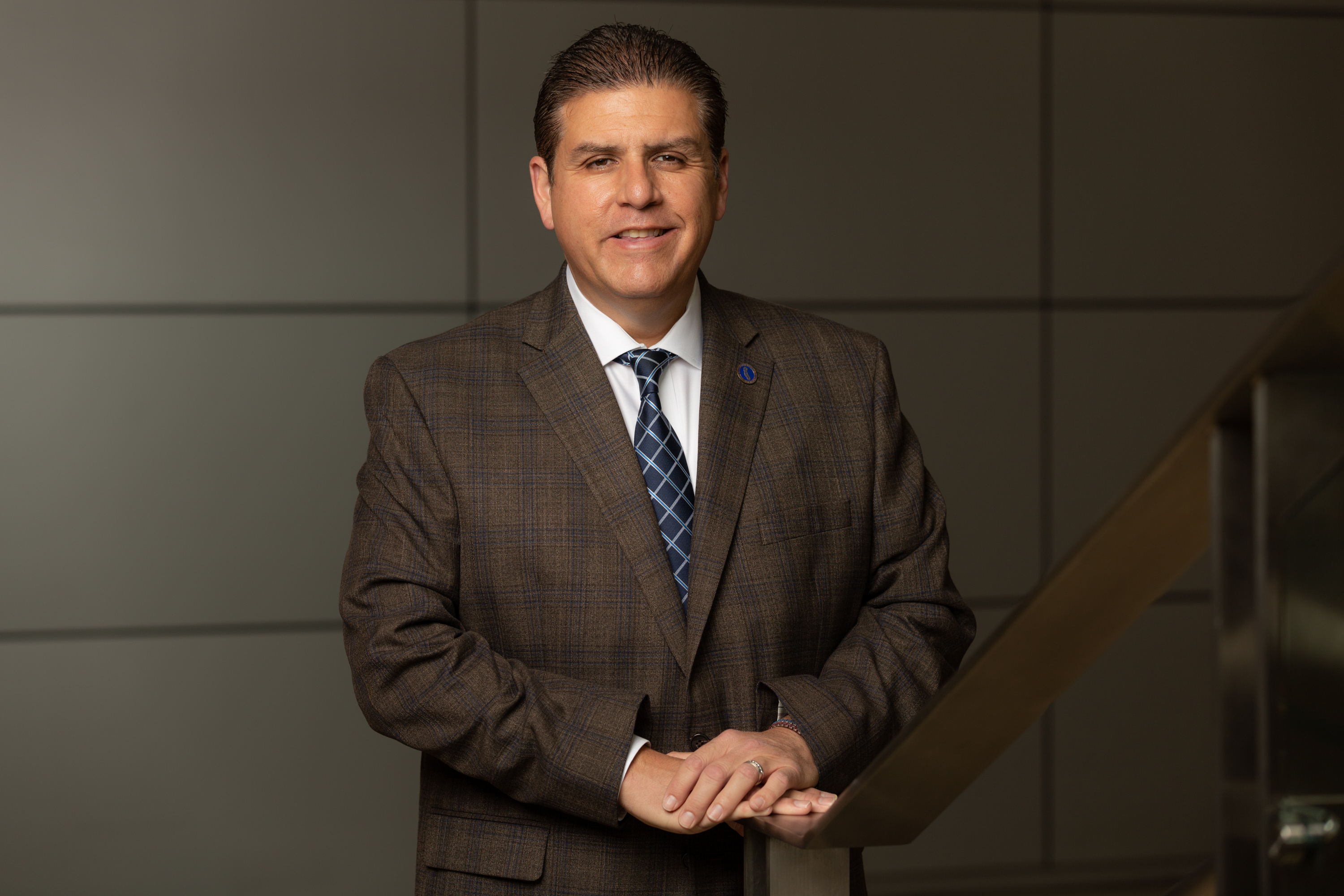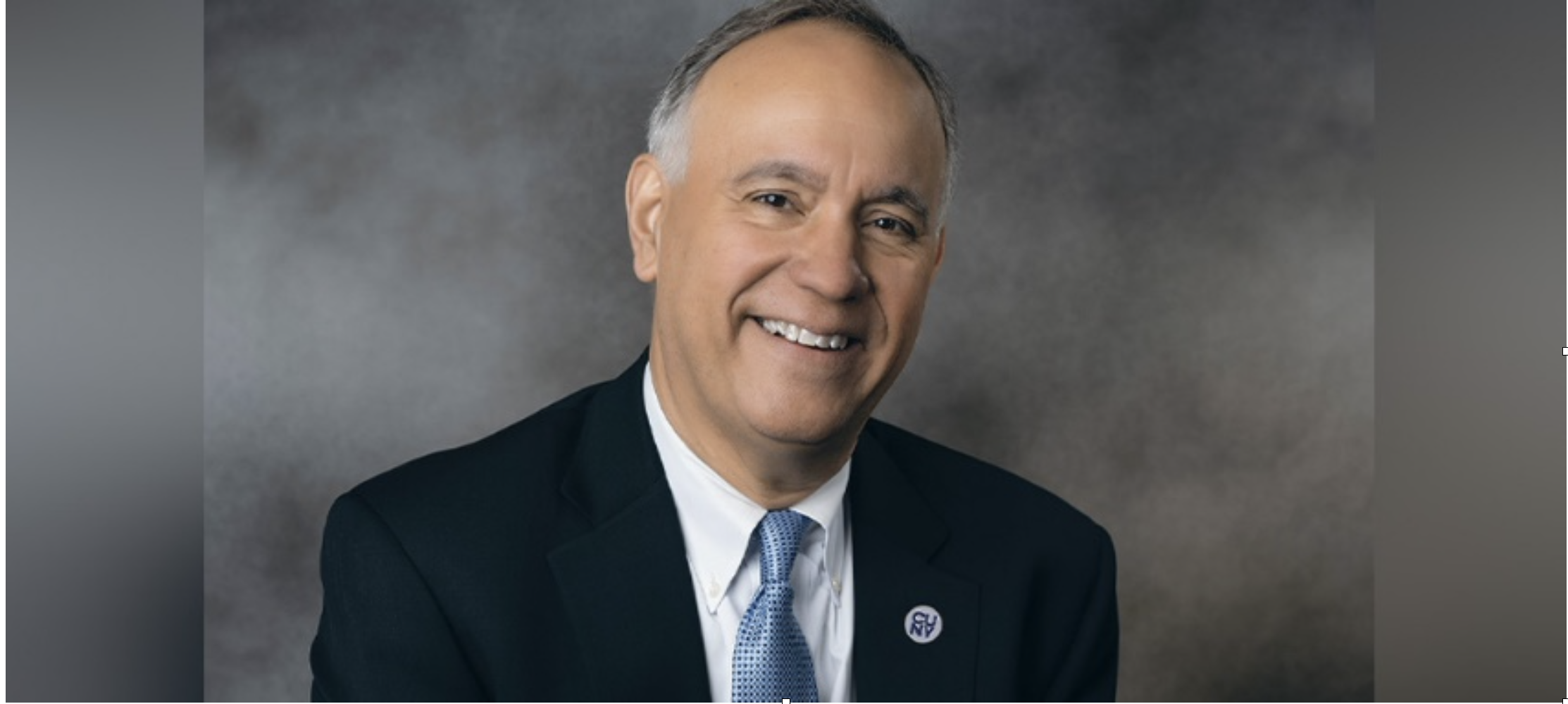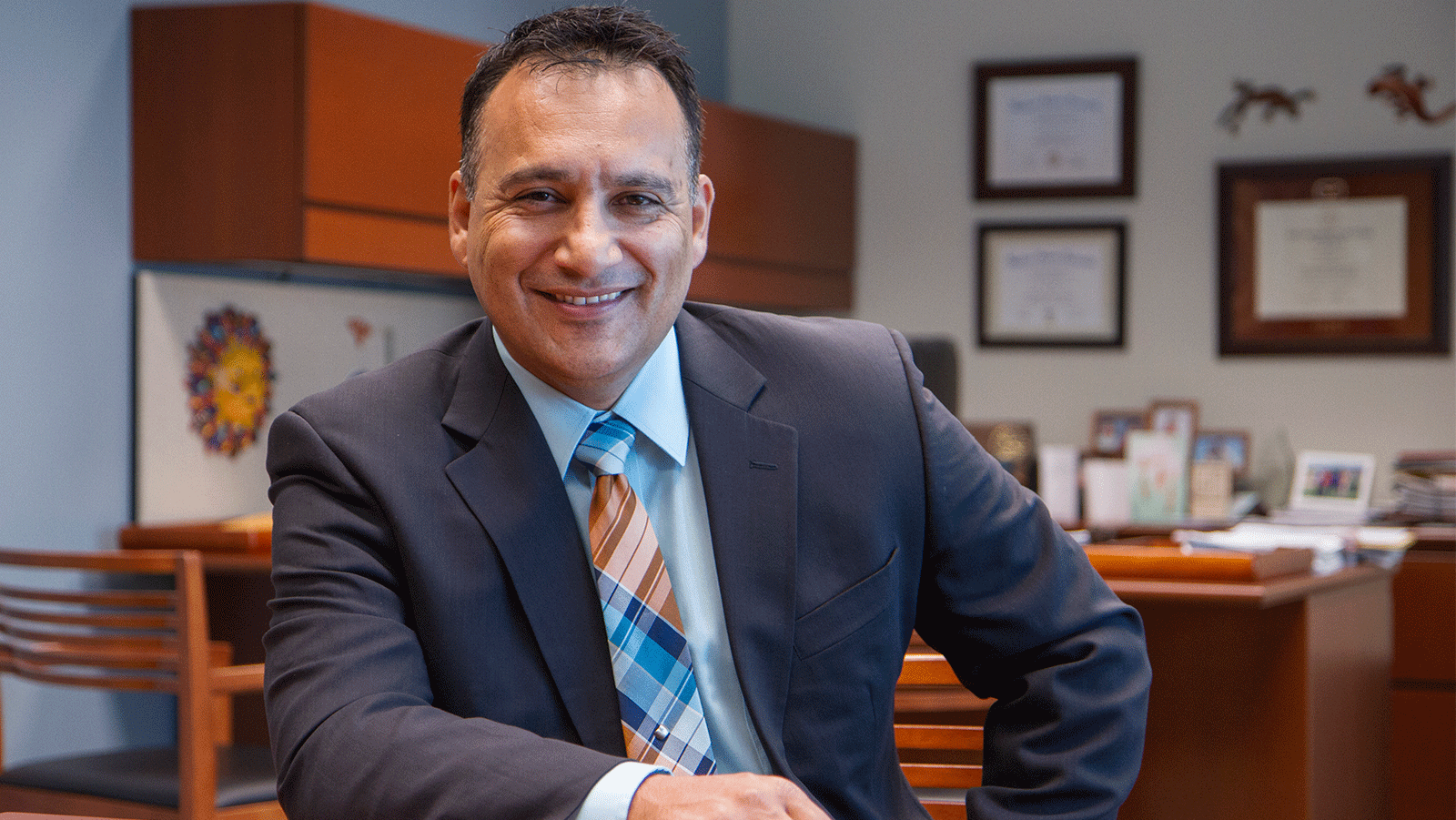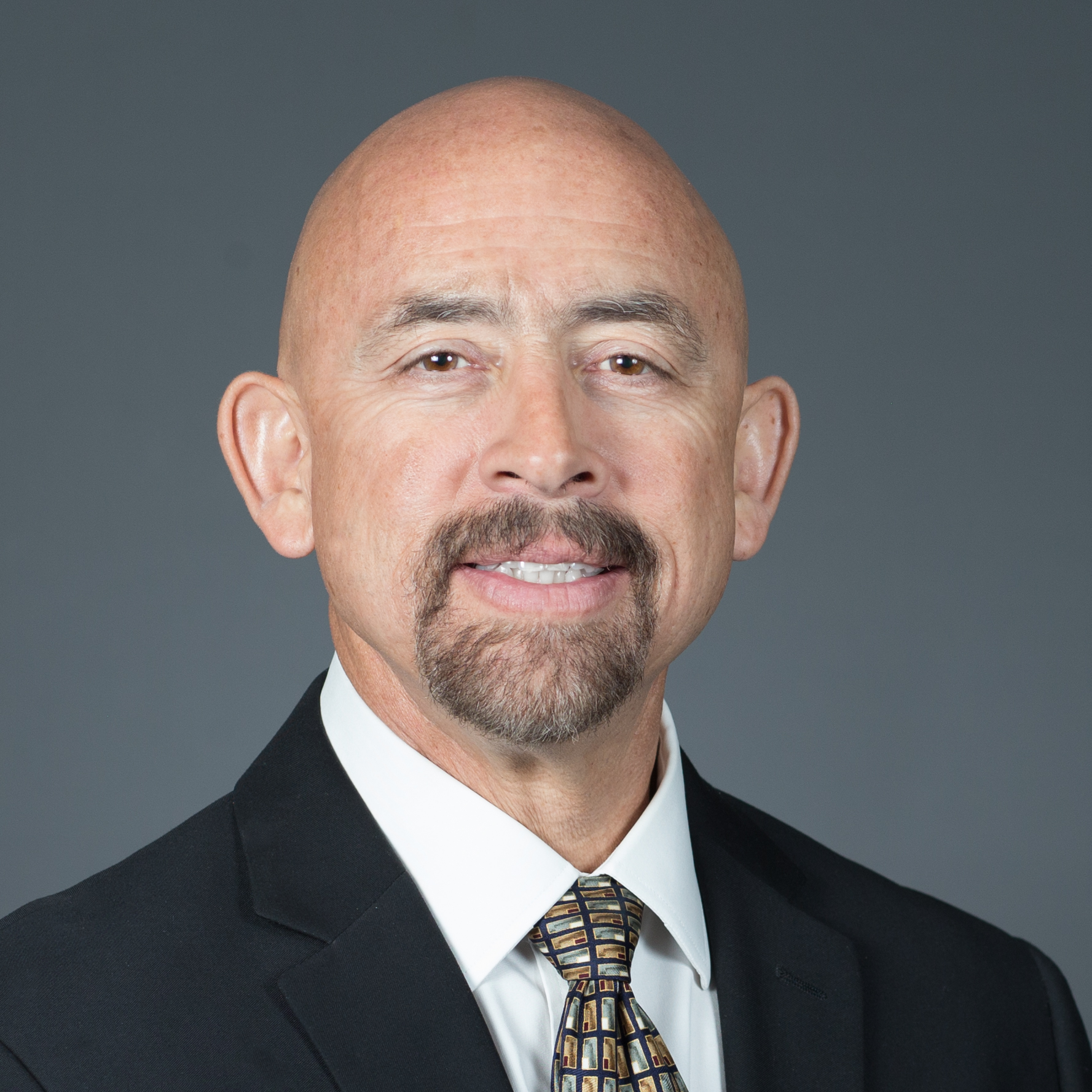Hispanic Chancellors Of The Nation’s
Largest College Systems
A cross the country, there are numerous examples of Hispanic leaders in education, from school district superintendents to college presidents. In this issue, Hispanic Outlook focuses on educators whose outstanding achievements have led them to occupy posts at the highest levels of leadership: as chancellors and presidents of state community college and university systems, and as leaders of some of the largest city or district higher education systems in the country (serving more than 100,000 students). The following list highlights the inspiring trajectories of these leaders and presents their efforts to improve educational opportunities for the diverse communities they serve.

Eloy Ortiz Oakley, Chancellor, California Community Colleges, and Temporary Senior Advisor to the U.S. Secretary of Education
The California Community Colleges (CCC) is the largest system of higher education in the U.S., and one of the largest in the world, with 2.1 million students at 116 colleges. Nearly half (45%) of students enrolled in the CCC system are Hispanic/Latino.1
Since 2016, the system is led by Eloy Ortiz Oakley, who was raised in South Los Angeles by Mexican-origin parents, served in the Army for four years, and then became the first in his family to obtain a higher education by attending Golden West College (a community college). From there, he transferred to the University of California, Irvine, where he obtained a B.A. in Environmental Analysis and Design and an M.A. in Business Administration2. He then became Superintendent of the Long Beach Community College District, where he was successful in improving student completion rates. He was appointed to the University of California Board of Regents in 2014 for a ten-year term, and is also a board member of the California Chamber of Commerce and the College Futures Foundation, among other high level state institutions.3 During Chancellor Ortiz’ tenure, CCC has adopted a Vision of Success that focuses on supporting the social and economic mobility of students of all backgrounds.
Chancellor Ortiz’ rich professional experience has been recognized at the highest levels, from providing testimony on minority-serving institutions in the Senate in 2014, to becoming a White House Champion of Change in 2016, to his current appointment as a Senior Advisor to the U.S. Secretary of Education, Miguel Cardona. In this current role (for which he is on a temporary sabbatical from the CCC) he will advise the Secretary on higher education issues, focusing particularly on measures to assist underserved students and supporting the Biden administration’s plan to provide two years of tuition-free community college to American students nationwide.4

Dr. Daisy Gonzales, Acting Chancellor, California Community Colleges
Dr. Daisy Gonzales’ life trajectory is an example of tenacity that provides inspiration to young people facing seemingly insurmountable odds: the daughter of struggling immigrant parents, she entered the foster system at the age of two, lived in multiple foster homes, attended high school in a crime-ridden community, and was discouraged by some teachers from continuing her education, as she was a first generation, English language learner. Nonetheless, with the support of other key teachers, she was able to learn English, graduate from high school, and attend the prestigious Mills College. Her life is also an example of generosity, as she decided to give back to the community by becoming a bilingual elementary school teacher in a low-income district, establishing a foster youth program, and then dedicating her career to improving access and equity for underserved students in higher education.5
Dr. Gonzales holds a BA degree in Public Policy from Mills College, and Masters’ and PhD degrees in Sociology from the University of California, Santa Barbara. At the age of 23, she became the youngest budget consultant for the California State Assembly Appropriations Committee, where she was responsible for analysis and political strategy in the areas of higher education, K-12 education and jobs and economic development. She became Deputy Chancellor of California Community Colleges in 2017, the first Latina and second woman ever to occupy this post. As Deputy Chancellor, she has been in charge of various key administrative divisions, including Student Affairs, and responsible for tracking the implementation of the CCC’s Vision for Success.6 She is a former Aspen Institute Presidential Fellow, and is a Co-Founder of the Sacramento Latina Leaders Network, among other affiliations. She recently received the 2021 Woman of the Year Award from California Lt. Gov. Eleni Kounalakis, in recognition of her outstanding service and leadership.7
Dr. Gonzales has been named Acting Chancellor of the CCC for the duration of Chancellor Eloy Ortiz’ service as advisor to the US Secretary of Education.

Dr. Joseph I. Castro, Chancellor, The California State University (CSU)
In January 2021, Dr. Joseph I. Castro became the first Mexican-American to become Chancellor of the California State University (CSU), the largest 4-year university system in the country, with more than 485,000 students on 23 campuses. CSU is also one of the most ethnically and economically diverse U.S. higher education institutions, with half of undergraduates receiving Pell grants (assistance for lower-income students), nearly a third of all students being first-generation college students, and 43% identifying as Hispanic/Latino. The majority of CSU campuses (21 of 23) are Hispanic Serving Institutions, with at least 25% Hispanic enrollment.8
Dr. Castro is the grandson of Mexican immigrants, who arrived in California about 100 years ago when his great-grandfather worked building the railroad through the San Joaquín Valley. He is the son of a single mother and was the first in his family to graduate from college; he obtained a BA degree in Political Science and an MA degree in Public Policy from UC Berkeley, and a PhD in Higher Education Policy and Leadership from Stanford University. Dr. Castro has stressed that the opportunity to go to UC Berkeley was life-changing, and the reason for choosing a career of service in higher education.9
Dr. Castro was part of the University of California system for more than 20 years, holding faculty or administrative leadership positions at five UC campuses, after which he became President of CSU Fresno in 2013. He has received numerous awards for his dedicated service to higher education, including five Excellence and Innovation Awards from the American Association of State Colleges and Universities, on different occasions, and the Ohtli Award in 2016, the highest honor bestowed by the Mexican Government to leaders who have contributed to the empowerment of Mexican-Americans in the United States.10
As Chancellor of CSU, Dr. Castro’s priorities are advancing on the Graduation Initiative 2025, which aims to close achievement gaps; increasing and diversifying funding sources; meeting the challenges of safe reopening; and harnessing the power of online learning.11

Félix V. Matos Rodríguez, Chancellor, The City University of New York (CUNY)
The City University of New York (CUNY) has been an engine of social mobility since 1847, when it was founded as the first free public higher education institution in the country. It is currently the largest urban public university in the United States, serving 275,000 degree-seeking students and 225,000 adult and continuing education students at 25 colleges across the city. CUNY has been essential to the cultural and economic life of NYC, but it is also a nationally and internationally recognized institution, producing numerous renowned scholars as well as 13 Nobel Laurates. At CUNY, nearly half (44%) of all students are the first in their families to attend college, a third were born outside of the U.S., and 31 % are Hispanic/Latino. Chancellor Matos Rodríguez sums up the ethos and impact of CUNY by calling it “an educational Ellis Island that provides a high-quality, affordable education and upward economic mobility to New Yorkers of all backgrounds.”12
Matos Rodríguez, who is Puerto Rican, became Chancellor of CUNY in May 2019 and is the first Latino to occupy this position. Matos Rodríguez holds a degree in Latin American Studies from Yale University and a PhD in History from Columbia University, has taught at various universities and is recognized for his scholarly work in the fields of history and Latino studies. He has a notable trajectory both in higher education and in public service, beginning with his tenure as Secretary of the Department of Family Services of the Government of Puerto Rico, and then becoming President of CUNY’s Hostos Community College and subsequently, President of CUNY’s Queens College.13
In an October 2019 interview with Hispanic Outlook, Matos Rodríguez discussed his plans for fundraising, for supporting first-generation students through joint programs with high schools, and for raising the visibility of CUNY overall.14 With Matos Rodríguez at the helm, CUNY has implemented a series of measures to ensure that all students - particularly those from lower-income families – have been able to continue with their studies during the pandemic.
In 2020, the Chancellor became part of an American Council on Education (ACE) national taskforce on improving credit transfer practices; he is also on New York City’s Education Sector Advisory Council, which will guide the post-pandemic reopening of schools.15

Dr. Steven R. Gonzales, Interim Chancellor, Maricopa County Community College District, Arizona
The Maricopa County Community College District (MCCCD) in Arizona has 10 campuses, including those in key cities such as Phoenix and Mesa, and serves nearly 200,000 students, making it one of the largest community college systems in the country. More than half of MCCCD students (51%) are the first in their families to attend college, and 35% are Hispanic/Latino. As with most community colleges, MCCCD prides itself on providing a channel of social mobility.16
Dr. Steven Gonzales was named Interim Chancellor of MCCCD in January 2020, after a search for a new Chancellor faced internal issues. He has continued in the role for an extended period, given the context of the pandemic which has further complicated the search. Dr. Gonzales holds a Bachelor of Science and an MA in Secondary Education Mathematics from Northern Arizona University. He has accumulated 25 years of experience in higher education, earning a PhD in Educational Administration from the University of Texas at Austin, teaching and serving in several top administrative positions at Central Arizona College for 15 years, and becoming President of GateWay Community College (part of the MCCCD system). He has occupied leadership positions at numerous associations and community organizations and is currently on the Executive Board of the American Association of Community Colleges (AACC) and of the National Community College Hispanic Council; he is also on the Board of Directors of the College Survey of Student Engagement of the Hispanic Association of Colleges and Universities (HACU).17
During his tenure as Interim Chancellor, the MCCCD has partnered with the National Governors Association and the American Association of Community Colleges to launch the Reskilling and Recovery Network, an initiative to identify and provide skills that are needed in a workforce that has been affected and reshaped by the pandemic.18 Recently, a new Arizona law has allowed community colleges to offer 4-year degrees, another new opportunity that Chancellor Gonzales is eager to take up: he plans for MCCCD to offer the first of these degrees by 2023.

Joe García, Chancellor, Colorado Community College System
The Colorado Community College System (CCCS) is the state of Colorado’s largest higher education system, serving over 125,000 students at 13 colleges. CCCS prides itself on providing careers and employment to underserved communities, including working parents, refugees, veterans and immigrants: 65% of students are eligible for Pell grants, 48% are first generation college students, and 24% are Hispanic/Latino.19
Joe García strongly believes that community colleges are a motor of social mobility, as he started his higher education journey at a community college himself (Northern Virginia Community College), before enrolling in the University of Colorado at Boulder.20 He went on to complete a degree in Law at Harvard University, and became the first Hispanic partner at the renowned, 100-year old Denver-based law firm Holme, Roberts and Owen, where he specialized in public education law. Since then, he has had an outstanding career in higher education policy, serving as President of a community college, then as President of Colorado State University-Pueblo, where enrollment increased notably during his tenure, and as President of the Western Interstate Commission for Higher Education (WICHE). Between 2011 and 2016, García served as Lt. Governor of Colorado and Executive Director of the Colorado Department of Higher Education, where he implemented policies to improve outcomes for all students, focusing particularly on underserved groups.21
García became Chancellor of the CCCS in 2018, where he has implemented various initiatives to close achievement gaps and increase equity. He has been active in various Latino organizations, including serving on the Executive Board of the Mexican American Legal Defense and Education Fund (MALDEF). In 2020, he was inducted into the Hispanic Association of Colleges and Universities (HACU) Hall of Champions, which honors exemplary efforts to “champion Hispanic success in higher education”.22
REFERENCES:
1. California Community Colleges, “Key Facts”, retrieved July 22, 2021: https://www.cccco.edu/About-Us/Key-Facts
2. California Community Colleges, “Chancellor’s Office: Meet the Chancellor”, retrieved July 22, 2021: https://www.cccco.edu/About-Us/Chancellors-Office/Meet-the-Chancellor
3. ACHRO/EEO, “Chancellor Eloy Ortiz Oakley: Bio”, retrieved July 22, 2021: http://achroeeo.com/wp-content/uploads/2020/10/Chancellor-Eloy-Ortiz-Oakley-Bio.pdf
4. Sara Weissman, “Advising the Biden Administration”, Inside Higher Ed, July 20, 2021, retrieved July 22, 2021: https://www.insidehighered.com/news/2021/07/20/california-community-colleges-chancellor-will-advise-biden-administration
5. Julienne Gage, “Spotlight on Dr. Daisy Gonzales: Deputy Chancellor of California’s Community College System”, Progress Report, June 25, 2019, retrieved July 22, 2021: https://progressreport.co/spotlight-on-dr-daisy-gonzales-deputy-chancellor-of-californias-community-college-system/
6. California Community Colleges, “Chancellor’s Office: Deputy Chancellor”, retrieved July 22, 2021: https://www.cccco.edu/About-Us/Chancellors-Office/Deputy-Chancellor
7. California Community Colleges, “Deputy Chancellor Daisy Gonzales Honored with California Legislative Women’s Caucus Woman of the Year Award”, Press Release, March 17, 2021, retrieved July 22, 2021: https://www.cccco.edu/About-Us/News-and-Media/Press-Releases/2021-daisy-gonzales-honored
8. CSU Fact Book 2020, retrieved July 22, 2021: https://www2.calstate.edu/csu-system/about-the-csu/facts-about-the-csu/Documents/facts2020.pdf
9. Jill Cowan, “Meet the New Chancellor of the Cal State System”, The New York Times, September 25, 2020, retrieved July 22, 2021: https://www.nytimes.com/2020/09/25/us/joseph-castro-chancellor.html
10. California State University, “Meet the Chancellor”, retrieved July 22, 2021: https://www2.calstate.edu/csu-system/chancellor/Pages/meet-the-chancellor.aspx
11. Jill Cowan, op.cit.: https://www.nytimes.com/2020/09/25/us/joseph-castro-chancellor.html
12. The City University of New York, “About CUNY”, retrieved July 22, 2021: https://www.cuny.edu/about/
13. The City University of New York, “About CUNY: Chancellor Félix Matos Rodríguez”, retrieved July 22, 2021: https://www.cuny.edu/about/chancellor/
14. Gary M. Stern, “CUNY’s First Latino Chancellor: Felix Matos Rodríguez”, Hispanic Outlook, October 2019, retrieved July 22, 2021: https://www.hispanicoutlook.com/articles/cunys-first-latino-chancellor-felix-matos-rodrigue
15. The City University of New York, “About CUNY: Chancellor Félix Matos Rodríguez”, retrieved July 22, 2021: https://www.cuny.edu/about/chancellor/
16. Maricopa Community Colleges, Fast Facts 2020-21, retrieved July 22, 2021: https://public.tableau.com/app/profile/maricopaanalytics/viz/FastFacts_15577867500260/FastFacts
17. Maricopa Community Colleges, “Chancellor: Biography”, retrieved July 22, 2021: https://www.maricopa.edu/chancellor/biography
18. Maricopa Community Colleges, “MCCCD Partners with National Governors Association to Reskill Workers During Pandemic”, Press Release, August 4, 2020, retrieved July 22, 2021: https://news.maricopa.edu/news-releases/mcccd-partners-national-governors-association-reskill-workers-during-pandemic
19. Colorado Community College System, “CCCS At a Glance”, retrieved July 22, 2021: https://www.cccs.edu/public-legislative-affairs/cccs-at-a-glance/
20. Colorado Community College System, “A Message from New System President Joe García”, retrieved July 22, 2021: https://www.cccs.edu/office-of-the-system-president/a-message-from-new-system-president-joe-garcia/
21. Colorado Community College System, “About CCCS: Chancellor”, retrieved July 22, 2021: https://www.cccs.edu/about-cccs/chancellor/
22. Colorado Community College System, “Chancellor Joe García Inducted Into HACU’s Hall of Champions”, CCCS News, October 26, 2020, retrieved July 22, 2021: https://www.cccs.edu/cccs-news/chancellor-joe-garcia-inducted-into-hacus-hall-of-champions/